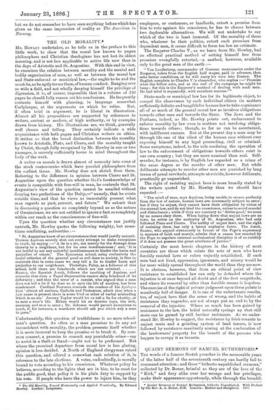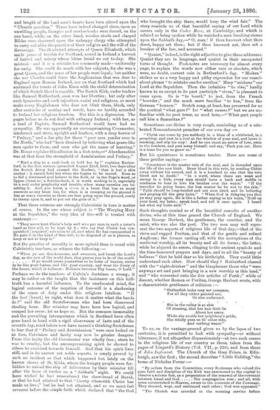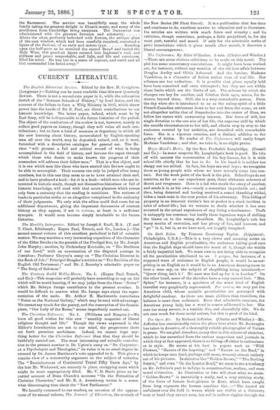QUAINT SERMONS OF SAMUEL RUTHERFORD.* THE words of a famous
Scotch preacher in the memorable years of the latter half of the seventeenth century can hardly fail to command attention ; and these " hitherto unpublished sermons," collected by Dr. Bonar, brimful as they are of the love of the " Kirk," and fiery alike over her wrongs and her privileges, make their appearance opportunely, while through the breadth
• Quaint Sermons of Samuel Rutherford. hitherto Unpublished. With Preface by the Rev. A. A. Bonar, D.D. London : Hodder and Stoughton. 1855.
and length of the land men's hearts have been stirred upon the " Church question." Times have indeed changed since, upon an unwilling people, liturgies and service-books were forced, on the one hand, while, on the other hand, wooden stools and clasped Bibles were showered upon the unhappy clergy who attempted to carry out alike the practice of their religion and the will of the Sovereign. The ill-advised attempts of Queen Elizabeth, which male years of trouble for Scotland, sowed in Ireland a harvest of hatred and misery whose bitter bread we eat to-day. She mistook—and it is a mistake too commonly made—uniformity for unity. She could do much with her subjects, for she was a great Queen, and the mass of her people were loyal ; but neither she nor Charles could force the Anglicanism that was dear to England upon Roman Ireland, nor on that Scotland which had embraced the tenets of John Knox with the stolid determination of which Scotch blood is capable. The Scotch Kirk, under leaders like Samuel Rutherford, soon won her liberties ; but only after such tyrannies and such injustices, social and religious, as must make every Englishman who does not blink them, blush, only after centuries of mutiny and revolt, have we tardily accorded to Ireland her religious freedom. But this is a digression. The pages before us do not deal with unhappy Ireland; with her, as a land of Papists, Samuel Rutherford would have had no sympathy. He was apparently an uncompromising Covenanter, intolerant and stern, upright and fearless, with a deep horror of " Prelacy," and a due pity for those " poor men yonder over in the North," who had" been deceived by believing what grave-like men spake to them, and men who got the name of learning." Dr. Boner explains this allusion in a foot-note,—" Aberdeenshire was at that time the stronghold of Arminianism and Prelacy."
" Bind a ship to a rush-bush to hold her by !" explains Ruther- ford, in the first sermon (preached August 22nd, 1640, two days after the Scotch Army had crossed the Border), " that is but a slim anchor ; it cannot hold her when she begins to be moved. Even so to bid a distressed soul believe in the Kirk, or in the Pope's word, or lippen [trust to] a Service-book, it is worth nothing to it, especially to a soul under perplexity and trouble, when many enemies are be- setting it. And, you know, a worm is a beast that has as many enemies as any beast has, for when it is creeping on the ground it has as many enemies as there are feet going upon the ground, ready to tramp upon it, and to pat out the guts of it."
That these sermons are strongly Calvinistic in tone is matter of course. In the one whose subject is "The Weeping Mary at the Sepulchre," the very idea of free-will is treated with contempt :—
" They never kent Christ's help well who put man in such a tutor's hand as free-will, to be kept by it ; who say that Christ has con- quershed [acquired] salvation to all, and when He has conquershed it He puts it in the hand of free-will, to be disposed of as it pleases, to keep or not to keep it."
But the practice of morality is more upheld than is usual with Calvinistic teachers, as witness the following :—
" When ye are drunkensome, and swearers, and break the Lord's day, as the rest of the world does, that proves you to be of the world.
If ye would prove yourselves to be heirs of heaven, strive to be like your father, and like your country, and wear the livery of the house, which is holiness : Holiness becomes Thy house, 0 Lord."
Perhaps we do the teachers of Calvin's doctrines a wrong; it may be rather on the taught that the insistance on this half- truth has a harmful influence. To the uneducated mind, the logical outcome of the negation of free-will is a slackening of the sense of duty under this religious fatalism. "If the hell [heart] be right, what does it matter what the hands do P" said the old Scotchwoman who had been discovered stealing hens. Her minister may have been less logical, and escaped her error ; let us hope so. But the common immorality and the prevailing intemperance which in Scotland have often gone hand in hand with a rigid observance of fasts and of the seventh day, must before now have caused a thinking Scotchman to fear that if " Prelacy and Arminianism " were once looked on as foes, Calvinism and laxity may now be greater dangers. From this laxity the old Covenanter was wholly free ; stern he was to cruelty, but the uncompromising spirit he showed to others he exercised towards himself. And that his spirit lives still, and in its narrow yet noble aspects, is amply proved by such an incident as that which happened but lately on the barren shores of St. Kilda., where the hungry people were for- bidden to unload the ship of deliverance by their minister till after the hour of twelve on a " Sabbath " night. We could have wished he had remembered the shew-bread of David, or that he had attained to that " liberty wherewith Christ has made us free ;" bat he had not attained, and so we must feel reverent before the simple faith which declared that "the God
who brought the ship there, would keep the wind fair." The story reminds us of that beautiful saying of our Lord which
occurs only in the Codex Bezce, at Cambridge, and which is related as being spoken while he watched a man breaking stones
upon the Sabbath day,—" 0, man ! if thou knowest what thou doest, happy art thou ; but if thou knowest not, thou art a breaker of the law, and accursed."
" Quaint," indeed, is the right adjective to give these addresses. Quaint they are in language, and quaint in their unexpected turns of thought. Foot-notes are necessary for almost every page, to explain the words now either rare or obsolete, which were, no doubt, current coin in Rutherford's day. " Misken" strikes us as a very happy and pithy expression for our round- about phrase " to mistake one for another." Mary "miskens " our Lord at the Sepulchre. Then the infinitive " to rive," hardly known to us except in its past participle " riven," is pleasant to Come upon. So is "to board," to jest, from the French " bourder ;" and the much more familiar "to ken," from the German " kennen." Scotch song, at least, has preserved for us the poetical " what gars ?" for " what causes ?" but we are un- familiar with its past tense, as used here,—" What gart people call him a Samaritan ?"
Sometimes our divine is very rough, reminding us of a cele- brated Nonconformist preacher of our own day :-
" Christ can come by you suddenly in a blast of a whirlwind, in a preaching, and cast in a coal at the window of your soul, and leave it smoking, and slip his way ! And he can shoot an arrow of love, even to the feathers, and post away himself, and say, 'Pack you out. Here is a bone for you to gnaw on.' "
But his quaintness is sometimes tender. Here are some of these gentler sayings :—
" Conscience is the master vein of the soul, and is threaded upon the life of the new birth. Draw blood in this vein, by sending Christ away without his errand, and it is a hundred to one that the vein bleed not to death." " In a word, where there are weak and strong in a kirk, every man should have a back and saddle in readiness to bear in love his brother over the water." "If the traveller be going home, the less matter he be wet to the skin." " Faith should be long-headed and not soon tired, and lie believing and praying till the grey hairs." " When God is delaying you that ye may pray again, He is like a father saying to his bairn, ' Hold up your head, my bairn; speak loud, and tell it once again. I heard not what my bairn said.' "
Such thoughts remind us of the beautiful conceits of another divine, who at this time graced the Church of England. We mean George Herbert, the gentleman, the courtier, and the saint, who was also the poet. The two men may well repre- sent the two aspects of religious life of that day,—that of the stern and rugged Puritan, and that of the gentle and refined Anglican ; the former casting off, with the corruptions of the mediaeval worship, all its beauty and all its forms ; the latter, while he abjured its errors, clinging to the ancient symbols and the time-honoured prayers and days, and to all the "beauty of holiness " that he held dear as his birthright. They could little understand each other. How should they P Rutherford classed with the " night-drinker " and the blasphemer those who "were anyways art and part bringing in a new worship in this land," and " who consented unto the five articles of Perth ;" while of dissent, whether Roman or Puritan, George Herbert wrote, with a characteristic gentleness of criticism :—
" Outlandish looks may not compare, For all they either painted are, Or else undressed.
She in the valley is so ahie Of dressing, that her hair doth lie About her eares.
While she avoids her neighbour's pride, She wholly goes on th' other side, And nothing wears."
To us, on the vantage-ground given us by the lapse of two centuries, it is permitted to look with sympathy—or without bitterness, if not altogether dispassionately—at two such scenes in the religions life of our country as these, taken from the
pages of Lingard's History (Vol. VII., p. 210), and from those of John Inglesant. The Church of the Grey Friars, in Edin- burgh, saw the first ; the second describes " Little Gidding," the home of Nicholas Ferrar :— " By orders from the Committee, every Scotsman who valued the pure faith and discipline of the Kirk was summoned to the capital to observe a solemn fast, as a preparation of the renewal of the covenant between Israel and God The congregation rose; and all, with arms outstretched to Heaven, swore to the contents of the Covenant. They shouted, wept, and embraced each other; God was appeased."
"The Church was crowded at the morning service before the Sacrament. The service was beautifully sang, the whole family taking the greatest delight in Church music, and many of the gentlemen from Cambridge being amateurs. The Sacrament was administered with the greatest devotion and solemnity Above the altar, profusely bedecked with flowers, the antique glass of the east window, which had been carefully repaired, contained a figure of the Saviour, of an early and severe type Kneeling upon the half-pace as he received the sacred Bread and tasted the Holy Wine, this gracious figure entered into Inglesant's soul, and stillness and peace unspeakable, and light, and life and sweetness, filled his mind. He was lost in a sense of rapture, and earth and all that surrounded him faded away."




































 Previous page
Previous page